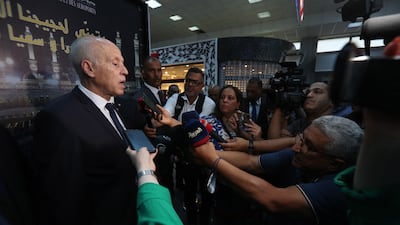Tunisia's interior ministry said on Friday it had confirmed information that there are serious threats to the life and safety of President Kais Saied.
“We are still gathering information regarding these threats that target Tunisian national security,” ministry spokeswoman Fadela Al Khulaifi said at a press conference.
“We continue to investigate and work on dissolving the ongoing plan to target the institution of the presidency.”
No details on the nature of the threats or the source of the information was provided.
Ms Al Khulaifi also said the ministry had arrested a man in connection with what it called a “terrorist” attack targeting police.
Local news agency Mosaique FM reported that the suspect, who had recently been released after a 17-year jail sentence, approached two officers outside a “sensitive site” in central Tunis in the early morning hours of Friday with a knife.
One officer was reportedly stabbed in the shoulder and the other received injuries to his hand before the assailant fled. Police arrested the suspect shortly afterwards.
An investigation into the man's associates and connections is continuing, though the spokeswoman said that currently he was thought to be a “lone wolf”.
The announcement of threats comes as both Tunisia's economy and political situation are in flux.
The International Monetary Fund announced on Wednesday that it was ready to begin formal negotiations with the Tunisian government for a new loan, but continued opposition from the country's largest trade union may stall negotiations.
Following a two-day visit to Tunis, Jihad Azour, the Director of the Middle East and Central Asia Department at the IMF, revealed that the fund was moving the process for Tunisia to secure a multi-billion-dollar loan from technical to formal negotiations.
In a statement, he stressed that “the severity of the economic situation” — with Tunisia heavily indebted and reeling from surging prices exacerbated by the war in Ukraine — “makes the need for swift implementation of ambitious reforms evermore pressing”.
Proposed reforms include slashing the public wage bill, cutting subsidies on food and fuel, and privatising loss-making state-owned enterprises.
While Mr Azour praised the “home-grown reform programme”, saying it had “the benefits of stronger ownership and greater credibility, and thus of a greater chance of success than in the past”, the country's largest trade union, the Tunisian General Labour Union, or UGTT, has criticised the planned austerity measures.
“We reject the conditions set by the IMF, given Tunisians' low salaries, lack of means, rising poverty and unemployment,” UGTT Secretary General Noureddine Taboubi told reporters on Thursday, one week after a UGTT-led strike of public sector workers.
Support from the union, which has more than 1 million members nationwide, will be critical to the success of any reform. Mr Saied acknowledged the need to “take social impacts into account” in any reforms during his meeting with Mr Azour.
“We support reforms, but we don't share the vision of reforms supported by this government,” Mr Taboubi said.
He called into question the current administration's mandate to negotiate a deal with the IMF.
“When there is a government produced by institutions and elections, it will have the legitimacy to start negotiations over reforms,” he said.
The rift between the UGTT and Mr Saied has deepened over the last 11 months since the president sacked the government, closed parliament and assumed sole control of the country last July. He later appointed his cabinet without parliamentary approval.
The UGTT initially supported Mr Saied's moves, which he said were necessary to save the country from political meltdown and to clean up corruption.
In recent months several high-profile members of political parties, most notably the Islamist party Ennahda, have been subject to arrest and detention on suspected corruption charges, including former prime minister Hamadi Jebali, who was arrested on Thursday on money laundering charges.
“[Mr] Jebali told us he will not answer the investigators’ questions and he entered into a hunger strike as the issue has a political motivation and nothing to do with money laundering”, his lawyer Mokhtar Jemai said, according to Reuters.
Earlier this year, police arrested Noureddine Bhiri, vice president of Ennahda, and held him for more than two months before releasing him without any charges being brought.
The UGTT soured on the president as he grew more isolated, further consolidated power in the executive and called for a referendum on a new constitution.
The union has boycotted participation in the “High National Committee for the New Republic”, the council responsible for drafting the new constitution which will be put to a referendum vote on July 25. Mr Taboubi claims the committee is only a means of rubber-stamping the president's political ideas.
Still, the union says it is open to the idea of constitutional reforms, and is waiting to see the draft of the new constitution before deciding whether to encourage its members to vote yes or no in the referendum, or boycott it all together.
Sadok Belaid, the constitutional drafting committee’s head, presented Mr Saied with a draft of the new document on June 20.
According to a presidential statement, “the draft constitution is not final and that some chapters of it are subject to review and further thought”, but a finalised version will be published by June 30 to encourage public debate.
Mr Saied is also contending with a weeks-long strike by the country's judges, who are protesting over the sacking of 57 of their colleagues, which has ground the judiciary to a halt.

